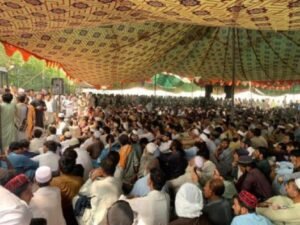Unraveling Relations: The Afghanistan-Pakistan Tensions Explained

Torkham border areas on the side of Afghanistan
By Kadeem Baloch
The relationship between Afghanistan and Pakistan has been marred by tensions and conflicts, particularly in recent months. Various factors contribute to the deteriorating trust between the two neighboring nations. Here a few of these factors are presented.
Non-Agreement on Durand Line
In an enduring border dispute that has spanned over a century, the internationally recognized boundary between Afghanistan and Pakistan, known as the Durand Line, continues to be a source of contention. Drawn up by Sir Mortimer Durand in the year 1893, this historical demarcation has yet to gain the full approval of Afghanistan, catalyzing a persistent atmosphere of tension between the two nations.
Pakistan staunchly upholds the Durand Line as its official border, but this stance has not been without opposition from Afghanistan. Accusations of territorial incursions by Pakistan into Afghan land have marred relations, resulting in sporadic confrontations along the Afghanistan-Pakistan border. The most recent incident unfolded in September 2023, when the crucial Torkham checkpoint, a pivotal juncture for cross-border travel, remained inoperative for an extended period due to a protracted gunfight involving Taliban forces and Pakistani border guards.
Situated at the juncture of a pivotal transit route connecting the South Asian neighbors, this gateway is a lifeline for inhabitants residing on either side of the Durand Line. Located at the terminus of Pakistan’s N-5 National Highway, it stands roughly 5 kilometers west of the Khyber Pass summit.
The closure of this vital border crossing had a ripple effect, causing extensive queues of hundreds of stranded cargo trucks and compelling thousands of individuals, including those in need of urgent medical attention, to seek refuge in local mosques and other makeshift accommodations. The head of the Afghan-Pakistani Joint Chamber of Commerce expressed grave concern, estimating that the closure inflicted multimillion-dollar losses upon businesses.
Attribution of these skirmishes frequently oscillates between both sides, with each side attributing the initiation of hostilities to the other. The absence of effective coordination and mutual trust among the respective armed forces has spawned a recurring cycle of violence, impacting not only the region’s security but also the well-being of Afghan refugees residing in close proximity to the contested border.
Increasing influence of TTP within Pakistan
Pakistan’s struggle to contain the activities of Tehrik-e-Taliban Pakistan (TTP), a terror organization operating within its borders, has added to the border tensions between Afghanistan and Pakistan. Pakistan has strongly alleged that the increased in terror attacks in Pakistan is due to the safe haven provided by Taliban to TTP terrorists within Afghanistan. Though it can’t be denied that the border villages on the Afghan side of the border have been used by TTPs as a base, the primary reason for the growth in the strength of TTP is the space provided to such terrorist organisation by Pakistan Army. By negotiating a ceasefire, TTP used this opportunity to increase its support base within Pakistan. Having been traditionally a hub of fundamentalists due to the presence of wide variety of diversified home-grown terror organisations, Pakistan provided enough cadre for the TTP to recruit and grow in strength. Now with no means to control this Frankenstein monster, Pakistan is blaming Afghanistan as the reason behind the growth of TTP. This has further strained the relationship between the two countries.
The Ill-Treatment of Afghan Refugees
One of the significant repercussions of the strained relationship between Afghanistan and Pakistan is the ill-treatment of Afghan refugees in Pakistan. Afghan refugees, who have sought shelter in Pakistan for decades, now face harassment and discrimination.
Law enforcement authorities in the southern Pakistani province of Sindh have apprehended over 250 Afghan refugees and migrants in a recent crackdown aimed at repatriating undocumented Afghans. The majority of these detentions and arrests have taken place in Karachi since September 11.
The arrests have been met with criticism from Afghan refugees and Pakistani human rights advocates who assert that these actions are primarily targeting economically disadvantaged Afghans unable to return to Afghanistan due to security concerns or economic hardships. The human rights lawyers involved in providing legal assistance to Afghan refugees in Pakistan highlighted that many of the detained Afghans possessed government-issued identification cards identifying them as Afghan nationals, suggesting racial profiling as the basis for their mass arrest. Afghan refugees in Pakistan have repeatedly reported harassment, a lack of information, and difficulties in completing the necessary paperwork to extend their stay in the country.
This crackdown by Pakistan was alleged to have been initiated by them following reported militant infiltration from Afghanistan into the Chitral district of Pakistan, where a gun battle resulted in the deaths of four security personnel.
Syed Abdul Jabbar, Consul General of Taliban-ruled Afghanistan in Karachi, communicated concerns to Pakistani authorities, asserting that registered Afghan refugees should not be arrested. He also called for leniency toward those lacking proper documentation, allowing them time to return to their country.
The recent crackdown and arrests of Afghan refugees by Pakistani authorities have raised concerns about racial profiling and the violation of refugee rights. Many of these refugees possess valid identification cards issued by the Pakistani government, further highlighting the mistreatment and lack of support they face.
Fragile economy
Cash-strapped Pakistan’s $350 billion economy is in a meltdown, with inflation at a record high. A rapidly depreciating currency and dwindling external foreign currency reserves, it is not in a position to provide any kind of financial/infrastructural support to the Taliban-led government in Afghanistan. The strained economic situation has diminished Pakistan’s influence and leverage over the Taliban, leading to a more independent and assertive stance taken by the Afghan Taliban.
With the honeymoon period between the Taliban-led Afghanistan and Pakistan over and both sides waking up to the realities, the key question is how they will address the fundamental issues and distrust between them to forge a lasting and harmonious partnership.
The author chooses a pseudonym. Kadeem Baloch is a freelance journalist based in Pakistan.
Note: The contents of the article are of sole responsibility of the author. Afghan Diaspora Network will not be responsible for any inaccurate or incorrect statement in the articles.





